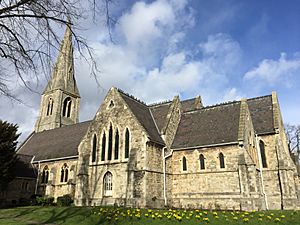St John the Evangelist, Penge facts for kids
Quick facts for kids St John the Evangelist's Church |
|
|---|---|
 |
|
| 51°25′00″N 0°03′18″W / 51.4167°N 0.0550°W | |
| Location | 2 St John's Road, Penge, London SE20 7EQ |
| Country | England |
| Denomination | Church of England |
| Churchmanship | Conservative evangelical |
| Website | www.penge-anglicans.org |
| Architecture | |
| Architect(s) | Edwin Nash, J. N. Round |
| Style | Victorian architecture, Gothic Revival architecture |
| Years built | 1850-1866 |
| Administration | |
| Parish | Penge |
| Deanery | Penge |
| Archdeaconry | Bromley and Bexley |
| Diocese | Rochester |
St John the Evangelist's Church is a historic Church of England church in Penge, which is part of the London Borough of Bromley in Greater London. When the church was first built, the area of Penge was actually part of Surrey.
The church stands on Penge High Street and is an important local landmark. It is known for its beautiful and unique design.
Contents
History of the Church
The story of St John's begins in the mid-1800s, during the Victorian era. The area needed a new church for its growing community.
Who Designed and Built It?
The first part of the church was built between 1847 and 1850. The design was created by a team of architects, Edwin Nash and J. N. Round.
Later, the church was made bigger. In 1861, Edwin Nash added aisles on the sides. In 1866, he also added sections called transepts, which give the church a cross-like shape from above.
What Does the Church Look Like?
The church was built in a style called Gothic Revival architecture, which was very popular in Victorian times. This style copied the look of grand medieval cathedrals.
- Stone Walls: The outside walls are made from a type of stone called ragstone, which gives it a rough, historic look.
- Tower and Spire: It has a tall west tower with a stone broach spire. A spire is the pointy top of a tower, and a "broach" spire is one that starts square at the bottom and becomes eight-sided as it goes up.
- Unique Windows: The windows have detailed stone patterns called "geometrical tracery." The architect Edwin Nash was known for his creative and slightly unusual designs, which you can see in the windows.
- Impressive Roofs: Inside, one of the most amazing features is the open timber roof. In the transepts, eight large wooden beams meet high up in the middle of the room, creating a stunning effect.
A Specially Protected Building
Since 1990, St John the Evangelist's Church has been a Grade II listed building. This is a special status given to buildings that are historically and architecturally important to the country.
Being "listed" means the church is protected by law. Any changes or repairs must be done very carefully to preserve its original character for future generations to enjoy.
Important People at the Church
A man named John Dudin Brown helped pay for the church to be built. He was a "wharfinger," which means he owned a wharf on the River Thames where ships would load and unload goods.
From 1872 to 1903, the church's organist and choir master was Arthur Carnall. He was also a composer who wrote music.
See also
References
 | Aurelia Browder |
 | Nannie Helen Burroughs |
 | Michelle Alexander |

